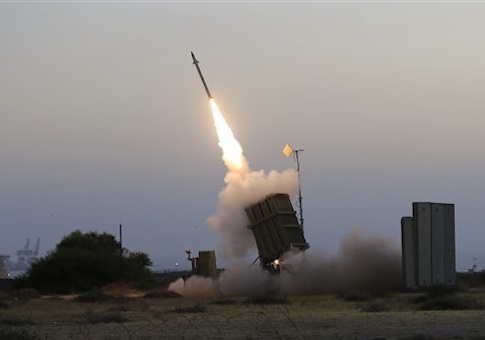JERUSALEM—Before the sirens stopped wailing last night, the staircase, serving as a shelter, was lined by neighbors, including some women in housecoats hastily donned. It was the first siren to be heard in Jerusalem since the fighting with Hamas began to intensify the day before.
As we waited, a faint thump could be heard in the distance. Then another. After 10 minutes, during which a new neighbor from upstairs took the opportunity to introduce himself, all said goodnight and disappeared into their apartments. It was the first direct confirmation that the war we had just been watching on television was not taking place in some distant land.
The thumps, we learned in the morning, were two missiles that had exploded in a village outside Jerusalem, causing no casualties.
It is Israel’s third confrontation with Hamas in five years and the public is pretty well drilled in how to behave, although newspapers today had illustrations to remind.
In older houses that have no shelters—such as mine—residents of upper floors are urged to descend two stories and shelter in the staircase. If on a street, you have about a minute to find shelter in a nearby building. Otherwise, lie on the ground and cover your head. If driving, carefully pull over, distance yourself from your car, and lie down.
The Israeli authorities have urged the public to continue with their daily routine, including letting children attend summer camps and nurseries. Only in a zone 25 miles from Gaza, which is the prime target area of Hamas rockets, are such facilities closed for the duration. "This is going to be a long war," said police chief Yohanan Danino. "Don’t change your plans."
A major factor in the relative tranquility in Israel despite the prospect of rockets falling from the sky at any moment is the Iron Dome defense system, which Israel developed, with American financial help, for precisely this kind of operation.
The system’s radar determines a rocket’s trajectory within seconds of its lift off from Gaza. Sirens are immediately sounded in the projected target area, providing 15-90 seconds of warning, depending on distance. The batteries ignore rockets heading for less populated areas but fire interceptors at those heading for built-up areas. Seven batteries have been deployed and military authorities claim that they have had a 90 percent success rate so far shooting down incoming rockets and missiles.
Despite the hundreds rockets fired at Israeli towns in the past few days, there have been no fatalities and only a handful of persons cut by shrapnel. Most of this is due to Iron Dome.
Luck has also been a factor—and Israelis know luck is not in infinite supply.
